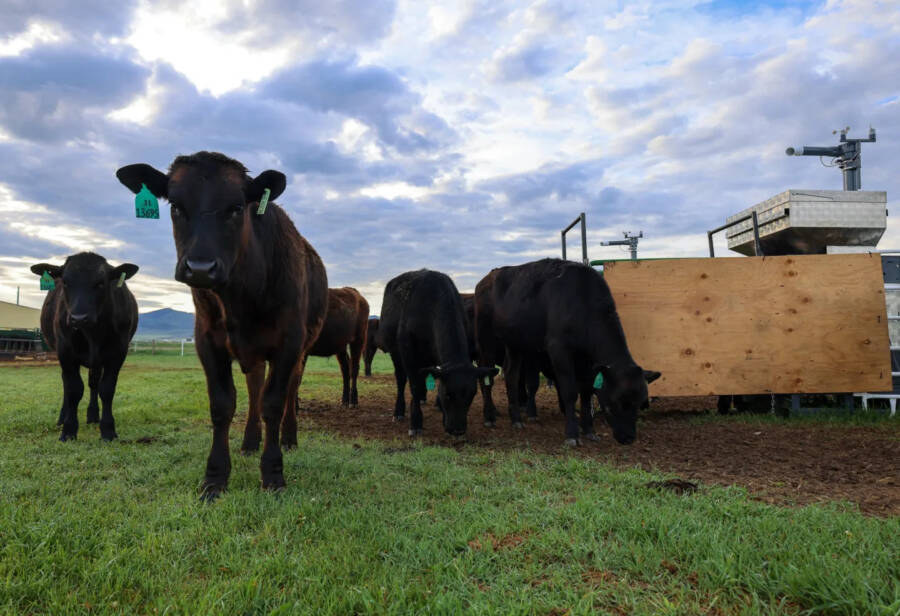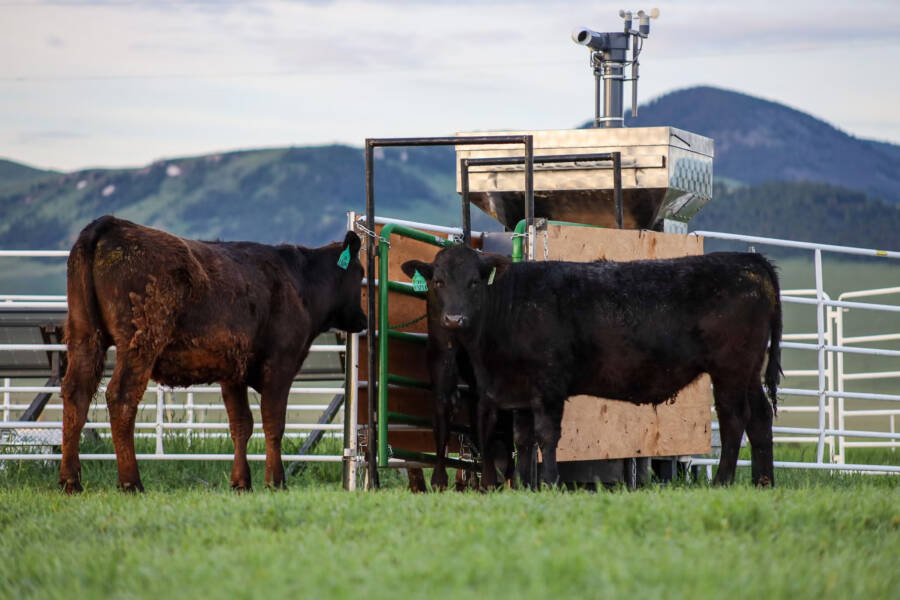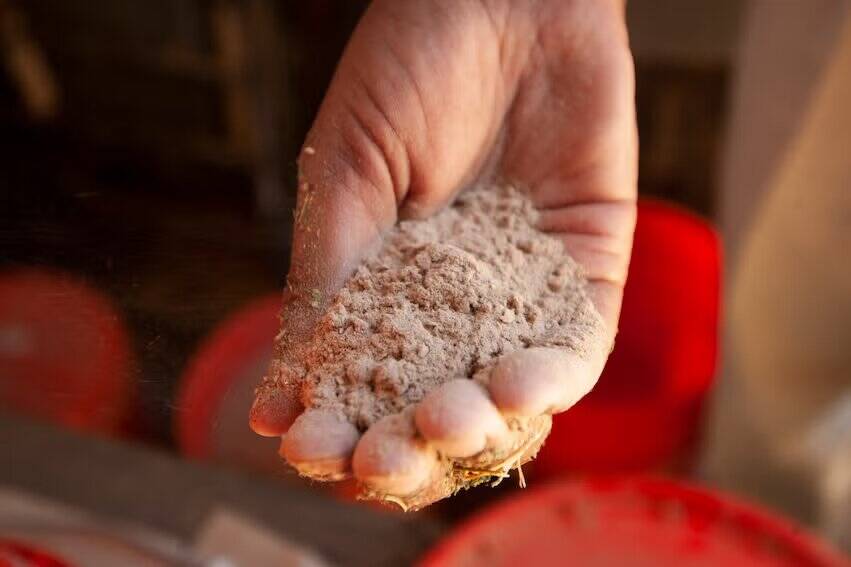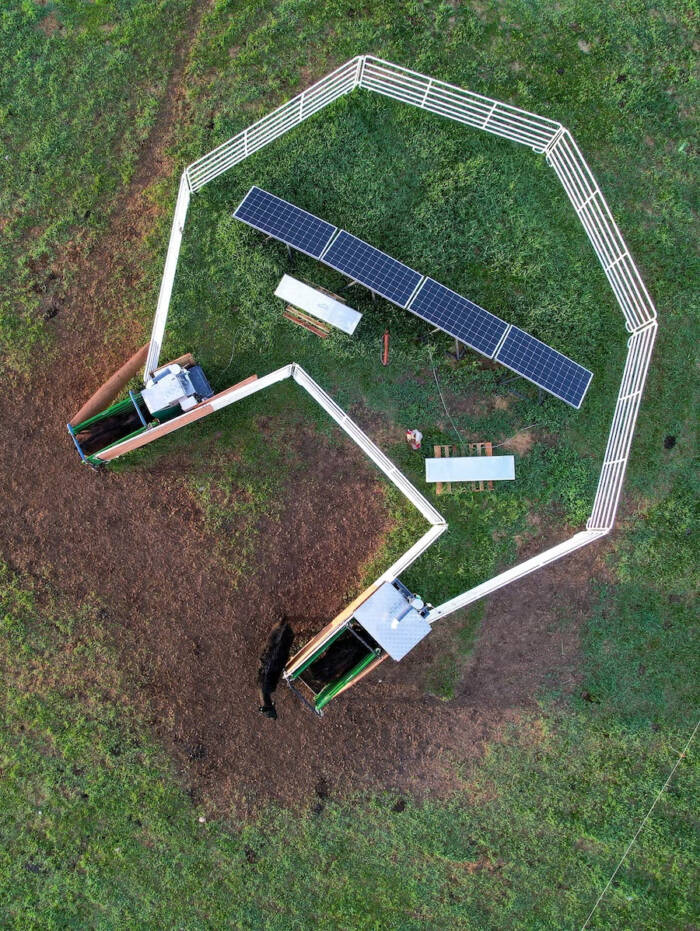A recent study found that seaweed can reduce grazing cows' methane emissions by up to 40 percent, a discovery that may have implications for battling climate change.

Paulo de Méo Filho/UC DavisCows graze on seaweed pellets at a ranch in Dillon, Montana.
Recent research has demonstrated that feeding cows seaweed can significantly reduce their methane emissions, which are a major contributor to the world’s greenhouse gases.
Raising livestock accounts for up to 20 percent of global greenhouse gas emissions, and the majority of those emissions are caused by cows belching. Scientists at the University of California, Davis previously determined that seaweed could help reduce the amount of methane released by dairy cows and feedlot cattle, which are raised in a confined area and fed grain and hay.
Now, the UC Davis research team has tested the seaweed pellets on grazing beef cattle and achieved similar promising results. Over a period of 10 weeks, cows on a Montana ranch that ate seaweed produced 40 percent less methane than the cows that didn’t have access to the pellets. The study supports the idea that seaweed could be successfully integrated into grazing cattle populations.
As cattle grazing accounts for two-thirds of agricultural land use in the world, this practical solution for farmers could provide a way to reduce environmental impact while maintaining productivity.
A Study Explores The Power Of Seaweed In Reducing Emissions

Paulo de Méo Filho/UC DavisBeef cattle on Matador Ranch in Dillon, Montana.
According to the United States Dairy Council and NASA, 97 percent of all the methane gas produced by cows is released by belching, while the remaining 3 percent is released through farting.
Methane is even more efficient than carbon dioxide at trapping heat in the atmosphere, which is the primary contributor to climate change. Rising temperatures may lead to environmental issues like worsening storms, crop failure, and increased insect outbreaks.
Researchers have worked hard to find a way to reduce cows’ natural emissions to improve climate health. Grazing cattle, in particular, have high-fiber diets due to the grass they eat, leading to increased gassiness.
In 2018, Ermias Kebreab and Breanna Roque from UC Davis published research showing that seaweed could drastically decrease methane emissions in cows. After trying out several cow “supplements,” the team landed on a type of seaweed mixture that includes red algae (a type of seaweed) cut with molasses for better smell and taste. The seaweed contains a compound called bromoform that blocks methane-producing enzymes.

Gregory Urquiaga/UC DavisThe red algae molasses mix fed to the cattle in the 2018 study.
The researchers split their 12 test cows into three groups to experiment with the efficacy of the mixture. Two groups were fed with varying amounts of seaweed, while the other group did not receive the supplement at all.
Four times a day, the researchers would measure the amount of methane produced by each of the groups — and they discovered surprising results.
“The numbers we’re seeing are amazing — well beyond the target that farmers will need to reach,” Kebreab stated in a press release from the university. In 2021, the researchers recreated the experiment and found that the cows that consumed doses of about 80 grams (three ounces) of seaweed gained as much weight as the control group cows while burping out 82 percent less methane.
Now, three years later, researchers have replicated these results once again, this time on grazing beef cattle, and provided convincing evidence for the use of seaweed to control cows’ methane emissions.
A New Study Strengthens The Argument For Seaweed Use In Cattle

Paulo de Méo Filho/UC DavisThe solar-powered machine used to dispense seaweed pellets and measure methane emissions from the beef cattle in Montana.
In a recent study published in Proceedings of the National Academy of Sciences, researchers described how they recreated the 2018 and 2021 experiments on grazing cows with similar results.
The study involved dividing 24 young neutered beef steers on a ranch in Dillon, Montana, into two groups. One group received seaweed pellets, while the other did not. During the 10-week experiment, the scientists noted that the cattle voluntarily ate the supplements. They calculated a 40 percent decrease in methane emissions among the group of cows that consumed the seaweed.
These results are important, as they show that cows will willingly consume the mixture while grazing — meaning that farmers do not need to feed the mixture to their cattle directly.
“This method paves the way to make a seaweed supplement easily available to grazing animals,” Kebreab stated in a recent press release from UC Davis. “Ranchers could even introduce the seaweed through a lick block for their cattle.”
Thankfully, researchers did not notice any changes in the activities or grazing habits of the cows.
“There were no changes in behavior or grazing patterns that we observed for cattle consuming seaweed pellets,” Kebreab told All That’s Interesting.
These results also have far-reaching impacts on cattle farmers outside of the United States. The method could provide an effective and easily implemented way for global farmers to reduce their cattle’s greenhouse emissions at a low cost.
As for how it can be implemented, Kebreab told All That’s Interesting that “One [way] is providing the additives to the farmers. Another way is to provide carbon credits for reducing methane emissions so that farmers are compensated for additional cost they will incur.”
Challenges, such as long-term impacts on cows’ health and the taste preferences of cows, are still being worked on.
“At the moment, we are working on enhancing the flavor which might be a barrier in pellets because they have to be concentrated. There are a couple of long term trials that are happening currently so we will know in 6 months to a year when they are published,” Kebreab told All That’s Interesting.
As methane reduction becomes an increasingly urgent priority, seaweed supplementation may offer a sustainable way forward.
After reading about the impacts of seaweed on cow emissions, dive into Turkmenistan’s Gates of Hell, the massive methane pit that has been burning since the 1970s. Then, read about the takin, the cow-goat hybrid that roams the countryside in the Himalayas.





